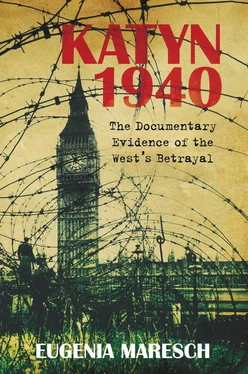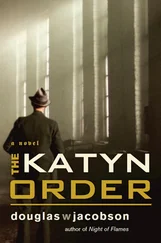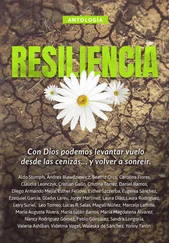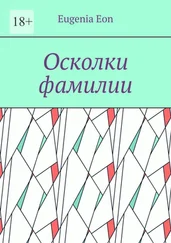Shortly after reaching Gnezdovo, Leutnant [Ludvig] Voss of the Geheim Feldpolitzei arrived. I showed Voss the button and told him that we had dug a hole and mentioned that there was a strong odour of decay arising from it. Voss therefore took with him a bottle of alcohol in the event of one of us becoming sick. We all went back to Koze Gory by motorcar and motorcycle. When we arrived on the spot, Voss ordered us to widen the excavation and to cut off the head of one of the bodies and remove it. Voss looked at the head and ordered us to put it back and put some earth on it. Voss strolled about in the forest, on the other side of the clearin, beyond the bog and we then returned to Gnezdovo.
The same day, Unteroffizier Gustav Ponka, an Austrian, took down a statement from me, through an interpreter Arholz, as to what I knew about the execution of the Polish officers. They also interrogated Ivan Andreev, nicknamed Rumba, from Nove Batoki.
I wish to state here that while I was making the statement, I was simply questioned as to what I did actually know. There was no question of threats or bullying. They treated Andreev, who was making a statement, in the same manner. I was not present during the depositions made by other inhabitants, but had the Germans beaten or threatened anyone I would have heard of it later. Anyway, the best proof of their behaviour during the interrogations is provided by the fact that since Kiselev was very old, he was not summoned to report in Gnezdovo, but Ponka and the interpreter went to his house and there took down his statement. I saw Kiselev fairly often afterwards and although aged, he was perfectly well and on the last day as I was evacuated westwards, i.e. on 24 September 1943, I saw him walking along with his wife and pushing a barrow in front of him. Moreover, there was no reason to beat up or threaten any of the interrogated people, because Kiselev as well as the others made their statements quite of their own free will.
Some days later the Red Cross Commission arrived. A large Red Cross flag was run up and the interpreter told us that this area was now at the disposal of the Red Cross. The Red Cross Commission talked with us, we were questioned as to what we knew of the execution of the Polish officers, but only the interpreter was present during these interrogations. We talked freely and no one bullied us.
I also talked with the delegation of Polish prisoners of war. At first we talked through an interpreter but one of the delegates of the Polish prisoners of war, an officer with two or three rank pips, told the interpreter that he spoke Russian and began to talk to us without an interpreter. In the delegation there was a Polish Lt Col but he could not speak Russian.
I also talked with the delegation of British prisoners of war. The Englishmen looked at the graves and then approached us; they were with the German chief of Propaganda. The Germans began to call for a ‘Dolmetcher’ and one man from the British group, a Polkovnik (Colonel) stepped forward and asked ‘Skoro platit nam diengi Germancy?’ (How much are you paid by the Germans?) Kiselev answered that he was not paid by anybody. The British delegates still asked us through this officer, how the Bolsheviks had brought the Polish officers to Koze Gory. Then they went to look at the graves of the executed Poles.
I also talked with members of the Polish Red Cross. I remember that when one of the bodies was exposed, the Poles on seeing his papers began to talk excitedly among themselves and it seemed to me that I heard them saying something about ‘Piłsudski’ [Marshal Józef Piłsudski, First World War hero]. This interested me so I walked up to them and asked what they were talking about. Then they shown me the papers and said they had discovered the body of Piłsudski’s personal doctor [Wiktor] Kaliciński.
At the end of May, the Germans finished digging up the seven graves on the near side of the bog and by that time all the bodies from these seven graves had been exhumed. From the small eighth grave on the other side of the bog, the Germans also exhumed some bodies but they laid them back in the grave and did not dig up any more. Among those who were making statements before the Germans was Ivan Andreev, nicknamed Shlopechka, aged 44, from the village of Zytko. This was not Ivan Andreev nicknamed ‘Rumba’, because of his bowed legs. In the summer of 1943, when rumours began to spread of the approaching Red Army, Shlopechka’s wife threw him out of the house, refusing to live with him. Then I understood that she was afraid that when the Reds came, all those who had made statements for the Germans would be punished for it.
During 1941 and 1942, after the arrival of the Germans, no military units ever stayed in the dacha . Neither was the whole area guarded or surrounded with sentries; there was no fence as this was taken down for fuel. It was permitted to walk about and I myself looked for mushrooms. Walking in the forest surrounding the; dacha was permitted by the Germans. Neither did I see the arrival of any motorcar except that belonging to the officer who was actually living there.
The inhabitants nearby did not take much interest in the whole affair, because everybody knew that the NKVD was shooting people in Koze Gory and what was happening there. Semyon Andreev from Nove Batoki, who was employed in a workshop attached to Depot No. 95 in Krasny Bor (Red Forest) and who used to arrive there by train, had been told by railwaymen that the NKVD were bringing the Polish officers from Kozelsk. I never heard it said that officers were also brought from Ostashkov or Starobelsk. Andreev left Russia before the German advance.
When the Red Army approached, I decided to leave with the Germans. Ivan Andreev ( Rumba ) was uncertain whether to go or to stay but I advised him to go for fear of the NKVD shooting him. After due consideration, he left by car with the German interpreter Teodor, whose surname I do not know. I also wanted to go with them but they did not offer to take me. I did not go till a day or two later, on foot. I asked a German gendarme who was controlling the traffic on the highway to help me to get away. He stopped a car, which was going to Orsha and so I was able to leave. I have heard the name [Borys] Meshagin, who was head of the town in Smolensk during the German occupation, but I do not know what has happened to him. I imagine he also went with the Germans.
I wish to add that when I made my first statement before the Germans, the first person being interrogated was Vasilkov, who came with us as the third man undergoing interrogation, Vasilkov was very nervous and when asked what he had seen, said he knew nothing. Then the interpreter told him’ If you know nothing and you won’t talk, you can go home.’
The interrogation was conducted in Polish, on occasions less understandable words were asked in Russian with the help of Lieutenant Marian Heitzman of the Polish General Staff in London. The witness signed all four pages of the document.
For exact translation. Major Stanisław Rodziewicz, Chief Judge Advocate of the Polish Navy. London 27 July 1946.
Polish Red Cross PCK Involvement
Certain extracts and conclusions of the Katyn report written by Kazimierz Skarżyński, Secretary General of the PCK, the Polish Red Cross in Warsaw, reached London by secure signals from the AK and these were incorporated into memoranda prepared by the Polish government for the use of Ambassador O’Malley and other departments of the Foreign Office. The report was never printed in its entirety, except in Polish books a few years after the war. [15] TNA FO 371/56476 N 5269/G, a 60-page report in Polish (translation by EM) in two parts by Kazimierz Skarżynski, Secretary General of the Polish Red Cross. Part 1 ‘ Sprawozdanie poufne ’ (Confidential report) dated Warsaw, June 1943; Part 2, dated September 1945, Nowa Wieś near Warsaw. Duplicate report with slight variations kept at PISM, KOL 12/4/19.
The first time the British were aware of it was in 1946, when a diplomatic bag arrived with a brief from Robin Hankey, [16] Robert [Robin] Maurice Alers Hankey (1905–1996) joined the Diplomatic Service in 1927 as Third Secretary in Berlin, then Paris, Secretary to the League of Nations in 1935, transferred to Warsaw in 1936 as First Secretary. Created Second Baron in 1939; moved to Bucharest in 1939–40 as Chargé d’ Affaires, moved to Cairo, then in 1942 to Tehran and Budapest. The rest of war years spent in FO, London. In 1945 moved to Warsaw, again in the FO as Head of the Northern Department. In 1949, Chargé d’Affaires in Madrid and in 1951 Minister Plenipotentiary in Budapest. KCMG in 1955, Ambassador to Sweden 1954–1960. Retired in 1965, much respected and liked by the Poles.
a Senior Counsellor of the FO who was posted to the Warsaw Embassy for the second time in his diplomatic career.
Читать дальше












